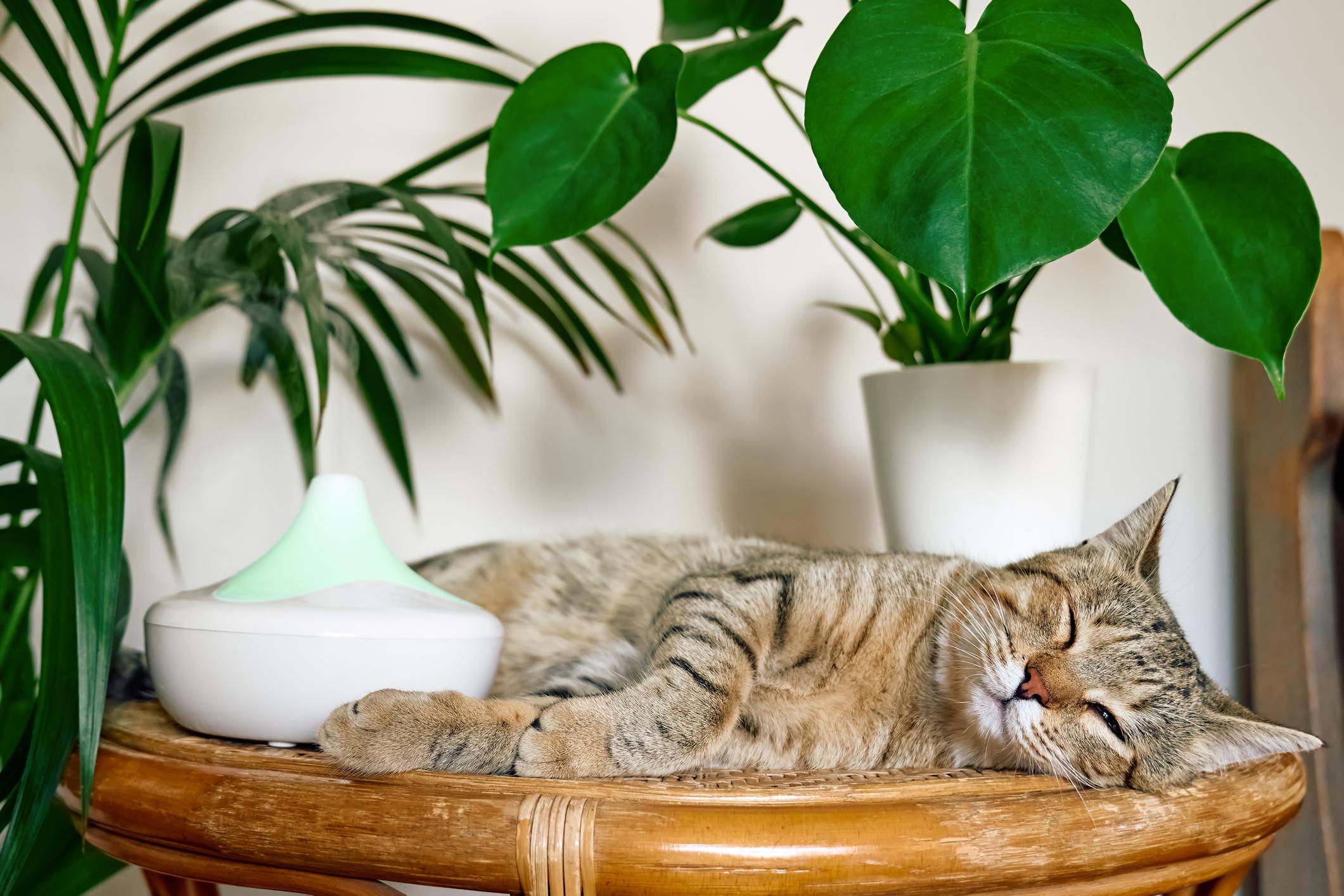Safe Scents: How to Use Essential Oils with Pets
Posted by Mosquito Squad
July 7, 2025

Essential oils are a popular natural method for deterring pests. They are commonly sprayed around yards, used in diffusers, or even diluted and used as natural topical travel bug sprays. When it comes to your pet’s safety, not all oils are the best choice. While many essential oils have insect-repelling qualities, pets like cats and dogs metabolize some compounds differently than humans do. What's safe for humans as a diluted spray can be toxic for pets. Before you reach for a bottle of lavender or peppermint, it's important to understand which essential oils are best for pets and how to properly use them.
What Essential Oils Are Safe for Cats?
There are very few cat-safe essential oils. Cats lack an essential enzyme (carnitine acylcarnitine translocase) in their liver that helps break down compounds in certain foods, including essential oils. While essential oils should never be ingested by humans or pets – to deter pests or for any other reason – cats groom themselves and will certainly ingest products on their fur. So, it’s important to only use natural deterrents that will be safe if consumed.
Small, heavily diluted amounts of catnip oil and cedarwood oil for cats may be used with guidance from a veterinarian. Cedarwood oil is the best essential oil that kills fleas on cats. It will also help kill ticks, mosquitoes, gnats, and more! Cedarwood oil dehydrates pests, ultimately killing them and causing them to fall off your pet. Catnip essential oil for cats won’t kill pests, but it has insect-repelling effects and can be a beneficial pest-prevention option if approved by your vet.
Is Lemongrass Safe for Cats?
No, lemongrass oil is not recommended or safe for cats because it is toxic if eaten and can cause liver damage. In households without cats, this popular essential oil is sometimes used topically or in diffusers to deter mosquitoes, ticks, flies, and gnats.
What Essential Oils Are Bad for Cats?
Because cats lack an essential liver enzyme, even minimal exposure to certain compounds through skin contact, inhalation, or ingestion can cause negative symptoms. These are the essential oils toxic to cats that should not be used to deter pests:
- Tea tree oil
- Eucalyptus oil
- Peppermint oil
- Cinnamon oil
- Pine oil
- Citronella oil
- Citrus oils (including orange, lemon, lime, and grapefruit)
- Lavender oil
- Lemongrass oil
If you notice your cat drooling, having difficulty breathing, or experiencing an upset stomach after you’ve used essential oils, stop using the product and contact your veterinarian.
What Essential Oils Are Safe for Dogs?
There are more options when it comes to essential oils that are safe for dogs. Oils like lavender and cedarwood are commonly used in pet-safe, highly diluted formulations designed to naturally deter pests through either topical application or spraying surrounding areas. These are some of the best essential oils for dogs:
- Lavender – Lavender essential oil for dogs can soothe skin while deterring ticks and fleas.
- Cedarwood – Cedarwood oil for dogs dehydrates and kills existing pests, including fleas, ticks, and gnats.
- Rosemary – This essential oil for fleas on dogs helps repel fleas, mosquitoes, and mites.
- Ginger – Ginger oil can repel mosquitoes. It also helps reduce skin inflammation and soothes irritation from bites!
- Lemongrass – This is a popular oil used to deter a variety of biting pests on dogs.
Remember that pet-safe essential oils are not substitutes for veterinarian-prescribed methods. If your dog is being affected by fleas or ticks, consult your vet for effective and safe treatment options.
Read more: How to Stop a Flea Infestation Before It Starts
Tips for Safely Using Essential Oils with Pets
Less is more when it comes to using essential oils for fleas on pets and other common pest issues. Use highly diluted blends only after consulting your veterinarian about using these products on or around your pet. Your vet can provide personalized advice based on your pet's health, age, and species. Always avoid applying oils to your pet’s face and other sensitive areas. Test any new oil in a small quantity, even after consulting your veterinarian. If applying topically, mix essential oils with a pet-safe carrier oil like coconut or vegetable oil. If you notice your pet has skin irritation, an upset stomach, or respiratory issues, stop using the product and call your veterinarian.
Using a safe essential oil for pets requires proper dilution, application, professional advice, and consideration for your individual pet’s sensitivity.
Read more: Essential Oils That Repel Mosquitoes and How To Use Them
Try These Pet-Safe Pest Control Options
Beyond appropriate essential oils, consider these other pet-friendly pest control options:
- Flea and tick collars
- Veterinarian-prescribed topical treatments
- Regular grooming and flea combing
- Professional outdoor pest control services
- Food-grade diatomaceous earth
For reliable professional pest control, Mosquito Squad Plus® offers a variety of services that target common pests that bother pets outdoors. We even have a natural treatment option. Our professional sprays help deter pests for up to 21 days and reduce your need for other pet-safe pest control.
Discover how your local Squad® can help you protect your pets when you call (877) 332-2239 or request a cost-free quote online.
